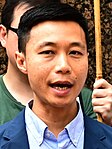| |||||||||||||||||||||||||||||||||||||||||||||||||||||
967 (of the 1,500) seats in the Election Committee 751 seats needed for a majority | |||||||||||||||||||||||||||||||||||||||||||||||||||||
|---|---|---|---|---|---|---|---|---|---|---|---|---|---|---|---|---|---|---|---|---|---|---|---|---|---|---|---|---|---|---|---|---|---|---|---|---|---|---|---|---|---|---|---|---|---|---|---|---|---|---|---|---|---|
| Registered | 7,971[1][a] | ||||||||||||||||||||||||||||||||||||||||||||||||||||
| Turnout | 4,389 (89.77%) | ||||||||||||||||||||||||||||||||||||||||||||||||||||
| |||||||||||||||||||||||||||||||||||||||||||||||||||||
The 2021 Election Committee subsector elections were held on 19 September 2021 for elected seats of the 1,500 members of the Election Committee (EC) which is responsible for electing 40 of the 90 seats in the Legislative Council (LegCo) in the 2021 election and the Chief Executive of Hong Kong (CE) in the 2022 election.[2]
Based on the new electoral framework imposed by the Beijing government, the composition of the Election Committee is drastically changed, seeing its size increasing from 1,200 to 1,500, with a sizeable number of new seats being nominated and elected by government-appointed and Beijing-controlled organisations, replacing a total number of 117 seats of District Council subsectors which would have been controlled by the pro-democracy camp due to the electoral landslide in the 2019 District Council election.[3][4][5] It was widely seen as Beijing's latest move to further curb the influence of the pro-democrats who were able to win more than a quarter of the total seats in the last election in 2016 and its following electoral success in the wake of the widespread anti-government protests of 2019.[6]
Under the new system, the registered voters for the Election Committee dropped by almost 97 per cent, sharply declining from 246,440 voters in 2016 to only 7,891 voters in 2021.[7] Only 13 of the 36 electable subsectors had a contested race, equal to around a quarter of the Election Committee seats involving 412 candidates and about 4,800 eligible voters, while the majority of the seats were either ex officio, nominated by special interest groups or elected uncontestedly.[8] With pro-democrats being purged before the election, the Election Committee was tightly controlled by the pro-Beijing camp with effectively no opposition presence.[9]
- ^ "Voter Registration Statistics". The Hong Kong Special Administrative Region Voter Registration. The Hong Kong Special Administrative Region Government. Retrieved 26 August 2021.
- ^ "Legco election to be held on December 19". The Standard. 13 April 2021.
- ^ "China moves to overhaul Hong Kong politics, squeezing democratic opposition". Reuters. 11 March 2021.
- ^ "Overhaul abolishes district council presence". RTHK. 30 March 2021.
- ^ "Who's in and out on new-look committee picking HK leader". The Standard. 31 March 2021.
- ^ "Demanding Loyalty, China Moves to Overhaul Hong Kong Elections". The New York Times. 4 March 2021.
- ^ Cite error: The named reference
plungewas invoked but never defined (see the help page). - ^ "Hong Kong elite selects powerful new 'patriots only' committee – voters reduced to 4,800, as 6,000 police deployed". AFP. 19 September 2021.
- ^ Cite error: The named reference
automaticallywas invoked but never defined (see the help page).
Cite error: There are <ref group=lower-alpha> tags or {{efn}} templates on this page, but the references will not show without a {{reflist|group=lower-alpha}} template or {{notelist}} template (see the help page).





